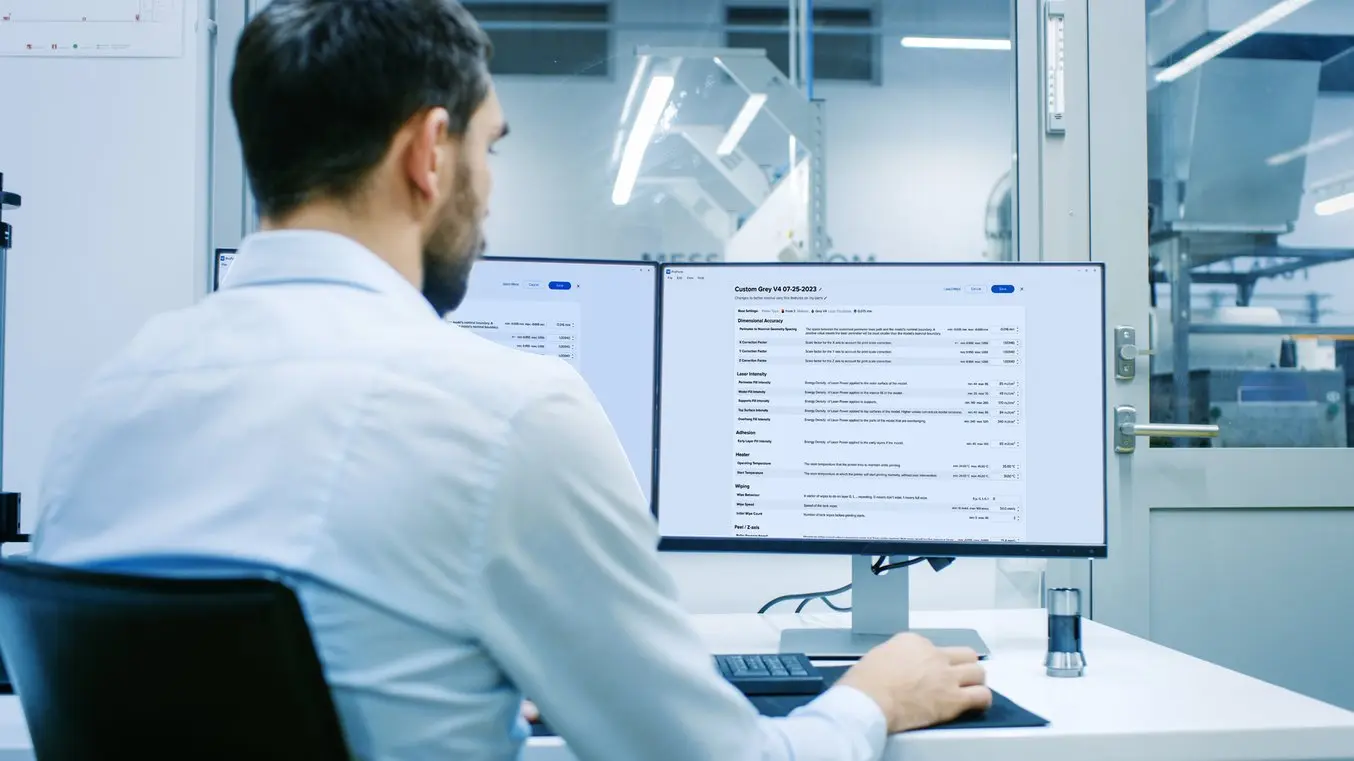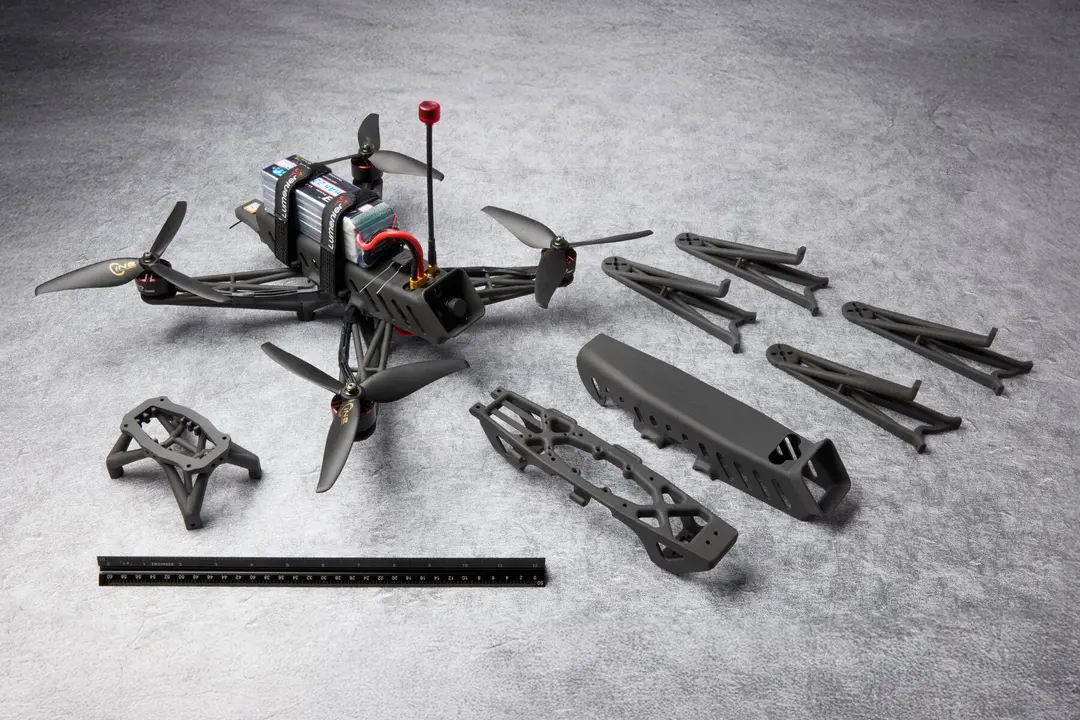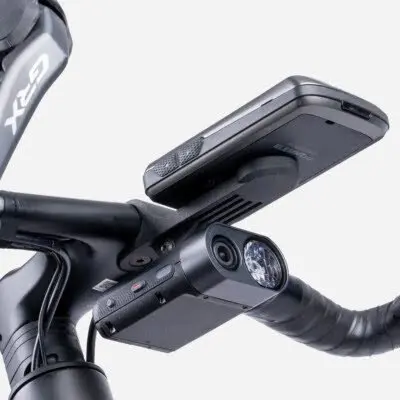Lowering Costs and Building Supply Chain Resilience at Cool Machines With Tough 1000 Resin

“The end-use products that we are offering, they need to be able to withstand our torture testing at freezing temperatures. These parts need to be able to take abuse and Tough 1000 Resin holds up.”
Adam Warren, Draftsman and Mechanical Designer, Cool Machines
Cool Machines is an Ohio-based manufacturer of insulation machines and technology. For COO Andy Schulte, supply chain resilience and cost savings are key. With Form 4 and Tough 1000 Resin, Cool Machines is developing and manufacturing end-use parts that can withstand freezing temperatures, impact, and pressures up to 600 psi.
Parts for insulation vacuums and blowing machines have complex internal structures. Product runs are small, generally 10-100 parts, meaning injection molding isn’t financially viable, while outsourcing machined aluminum can take up to two months.
Adam Warren, draftsman and mechanical designer, says the company started with Elegoo resin printers, bringing three in-house during COVID in an attempt to add supply chain resilience. However, there were constant issues with the printers and tech support was unreachable. Warren says, “At that point, I started just looking for 3D printers with tech support that I could actually count on, and I wanted US tech support.”
“There aren’t that many resin 3D printers made in the US with stateside support — that was one of my requirements. We haven’t looked back — Formlabs tech support has been amazing.”
Adam Warren, Draftsman and Mechanical Designer, Cool Machines

Talk to Our Sales Team
Whether you need to prototype at speed, or are producing end-use parts, we’re here to help. The Formlabs Sales team is composed of dedicated specialists who know exactly how to support you and your company's needs.
In-House Manufacturing for Supply Chain Resiliency
Small parts, such as knobs for a dial, might cost four dollars per part, and can be difficult to get from suppliers, while printing 15 in-house costs less than a dollar per part and can be done in 90 minutes on Form 4 in Black Resin. After proving the use case with their first few parts, Cool Machines is always looking at parts they can print in-house to improve supply chain resiliency, reduce costs, and minimize timelines.

15 Rheostat Knobs can be printed in 90 minutes on Form 4 for a quarter of what it would cost to purchase them.
In addition to these savings, 3D printing allows for design flexibility, with the ability to produce complex geometries and undercuts that cannot be achieved by machining aluminium or injection molding, expanding the types of components Cool Machines can manufacture in-house.
Tough Parts With Tough 1000 Resin
Developments in material science have expanded what is possible to print. Schulte says, “I’ve been really impressed with Formlabs’ innovation on new resins and improving the product.” Beyond knobs and small components, the end-use products Cool Machines produces need to be able to withstand torture testing at freezing temperatures, and the impacts of a jobsite, where users move them around with force. Warren was therefore looking for a material like Delrin that could print 1/4" NPT threads. Enter Tough 1000 Resin.
Tough 1000 Resin is a ductile, impact-resistant material with toughness that rivals HDPE. It’s a dark, deep grey color and prints with a matte finish. Warren says he can set up parts with one click in PreForm, Formlabs print preparation software. After printing and post-processing, he can just tear off the supports and that’s it — no sanding or finishing required.
| Ultimate Tensile Strength | Tensile Modulus | Elongation at Break | Gardner Impact Strength @ 1/32 in | Work of Fracture | Heat Deflection Temp @ 0.45 MPa | |
|---|---|---|---|---|---|---|
| Tough 1000 Resin | 26.3 MPa | 932 MPa | 180% | 13.1 J | 3200 J/m2 | 55.3 ºC |
The mechanical properties of Tough 1000 Resin enabled the in-house manufacturing of two parts: an Internal Wetting System (IWS) and Wall Spray Nozzle. Both need to withstand force, freezing, and the impacts of a worksite.
Request a Free Sample Part
See and feel Formlabs quality firsthand. We’ll ship a free 3D printed sample part to your office.
Internal Wetting System

The Internal Wetting System is an end-use part printed on Form 4 in Tough 1000 Resin.
The Internal Wetting System injects a fine spray of water into the fiber stream to help reduce dust. Formerly produced in aluminum, Schulte says, “We found that the insulation would want to stick to the aluminum, but it doesn’t for the plastic, so plastic is a much better material for this application. It’s all been holding up well, even with customers pulling on the hoses.”
On job sites, users often pull hoses to move equipment around, meaning the Internal Wetting System has to withstand brute forces and impacts at freezing temperatures. The impact resistance of Tough 1000 Resin made it a good candidate for the Internal Wetting System, and the 3D printed parts have withstood both torture testing and worksite use.
“This part did pass the freezing drop test from 10’ on concrete, being kicked around, stepped on, stomped on, jumped on… I’d say it was a pretty good part to run with.”
Adam Warren, Draftsman and Mechanical Designer, Cool Machines
Wall Spray Nozzle

A prototype of the Wall Spray Nozzle, used to spray insulation into open wall cavities before the drywall goes up.

Components of the Wall Spray Nozzle 3D printed in Tough 1000 Resin.
The Wall Spray Nozzle is the result of five months of development and wouldn’t be possible without 3D printing due to the geometry of the interior. For prototyping, Warren relied on the speed of Form 4, saying, “If it doesn't work, I can have the next version ready on the printer the next day for testing.”
A key requirement for the Wall Spray Nozzle was withstanding the water pressure. Schulte did some internal testing and got the 1/4" NPT threads to hold at up to 900 psi. He also did freezing drop and impact tests. Next up are field trials. If the Wall Spray Nozzle survives, Cool Machines will manufacture it in the same way they prototyped — 3D printing on Form 4 in Tough 1000 Resin.
Manufacturing Tough Parts In-House
By bringing Form 4 in-house, Cool Machines brought down part costs and created supply chain resilience. But it is advances in material science that have enabled the manufacturing of high-performance end-use parts.
Tough engineering materials that rival thermoplastics can be 3D printed, expanding the geometries of what is possible to manufacture while shortening timelines. To evaluate Tough 1000 Resin for yourself, request a free sample part. To start printing, buy Tough 1000 Resin or contact sales.


